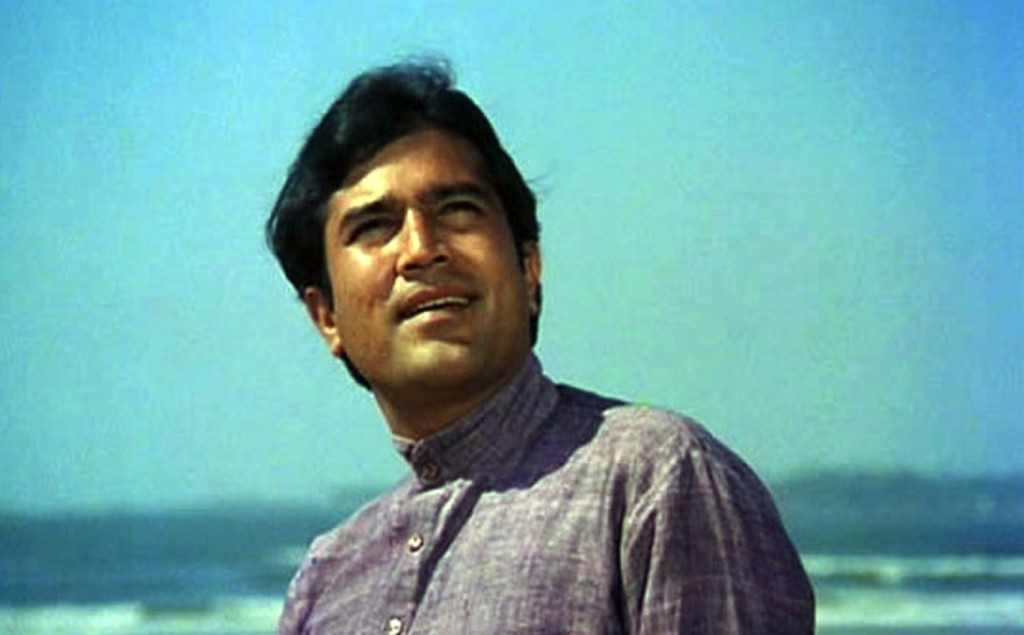Dr Bhaskar Bannerjee (Amitabh Bachchan) wins the Saraswati Award for his maiden work as a novelist. Whilst accepting the award, Bhaskar reveals that the character in his novel is not fictitious but is actually based in a real person named Anand. Anand (Rajesh Khanna), who was suffering from the final stages of cancer, first came to Dr. Prakash Kulkarni (Ramesh Deo), a close friend of Bhaskar. Prakash tells Bhaskar about his reluctance to take Anand as his patient, but after meeting Anand, he was astonished that a dying man could have such a wonderful zest for life and happiness. Bhaskar despite his education and success, is a brooding, bitter and frustrated man. Anand’s exuberence brings Bhaskar out of his shell and even helps a tongue tied Bhaskar win over his lady love, Renu (Sumita Sanyal). The two men becomes fast friends and Anand, an interal part of Bhaskar’s life. Bhaskar tries hard to cure Anand but all his efforts are finally in vain; ultimately Anand dies, but not before leaving behind a universal message of love and happiness.
Up to Anand, though Hrishikesh Mukherjee had arrived following Anari (1959) and Anuradha (1960) and was making films round the clock, barring a stray Asli Naqli (1962), Anupama (1966), Ashirwaad (1968) and Satyakam (1969) which had their strong moments, many of his films were largely adequate and no more. Anand, however, changed all that. Dedicated to Raj Kapoor and the city of Mumbai (then Bombay), it is undoubtedly Hrishida’s masterpiece, his greatest film.
Looking at a man dying of cancer but who is determined to make every moment of his remaining life happy, Anand is a bittersweet film with great compassion, a delicate balance between hope and fear, between life and death, between joy and sorrow, between humour and pathos. The moral of the story is emphasized via the recording of the hero’s voice, replayed after his death as he enjoins the audience to value a large-hearted life over a merely long one.
It is said that Anand was planned with Raj Kapoor in mind. But Hrishida, a very close friend of Raj Kapoor, felt it would be too painful to see his dear friend die even if it was on screen and toyed with the idea of casting Shashi Kapoor before deciding to take on Rajesh Khanna.
Today as one views Anand, the film is unthinkable without Rajesh Khanna. Take him away and there is no film. As the selfless, boisterous, humerous non-stop chatterbox changing the lives of those around him in particular Amitabh Bachchan, or having his quiet, serious introspective moments – Khanna is nothing shot of brilliant. Anand’s address of Bhaskar as ‘Babumoshai’ was replete with affection, warmth and had a teasing note to it. The same playfully affectionate address takes on profoundly tragic overtones when Anand’s recorded message tries to comfort Bhaskar as he weeps over the death of his patient who had also become his closest friend. In Anand, Rajesh Khanna more than justified Frank Capra’s immortal observation, “Tragedy is not when actors cry. Tragedy is when audiences cry.”
Indeed, at the end of Anand as Amitabh sits by Khanna’s dead body and as the tape recorder plays Khanna’s voice, you cannot help but cry along with Amitabh. Such was the impact of Khanna’s performance that apart from winning the Filmfare Award for Best Actor for the film, when Star & Style held an Essay Competition in the 1980s on ‘the film where a single performace carried the film through’, the top two prize winning entries wrote about Khanna in Anand ahead of even Nargis in Mother India (1957)!
Khanna aside, Anand also sees a brilliant understated performance by Amitabh Bachchan acting in only his second film. He beautifully captures the pain and frustration of a doctor who knows his science can do nothing to save a man who has become an inseperable part of his life. Bachchan deservedly won the Filmfare Best Supporting Actor for the film. Sumita Sanyal, Lalita Pawar, Ramesh and Seema Deo, Durga Khote and especially Johnny Walker lend solid support.
A major highlight of the film is Salil Chowdhury’s music. Each of the songs – Maine Tere Liye, Kahin Door Jab Din Dhal Jaaye, Zindagi Kaisi Hai Paheli and Jiya Lage Na are extremely well written and composed. Interestingly the three Rajesh Khanna songs are sung by Mukesh (Maine Tere Liye, Kahin Door Jab Din Dhal Jaaye) and Manna Dey (Zindagi Kaisi Hai Paheli) and not Khanna’s regular voice – Kishore Kumar. But both Mukesh and Manna Dey come through strongly and make the songs their own.
Apart from the Best Actor and Supporting Actor Filmfare Awards, Anand also won the Best Picture and Best Story (Hrishida) Filmfare Awards as well as a National Award for Best Hindi Film.
Anand led to other films using the formula of endowing the central character with a terminal disease. In fact, Hrishida himself revisited the theme with Mili (1975) featuring a terminally ill Jaya Bhaduri opposite a cynical and alcoholic Amitabh Bachchan.
Following Anand, Hrishida went on to do some of his life’s best work in the 1970s – with Guddi (1971), Bawarchi (1972), Abhimaan (1973), Namak Haram (1973), Chupke Chupke (1975), Mili (1975), Golmaal (1979) and Khubsoorat(1980). These films show that Hrishada understood middle-class mentality as very few others do. He poked gentle fun at its outworn values, its failings and foibles, and prodded his audience to think. It was a golden period of his career.
All in all, Anand is a great film by a great filmmaker.
Hindi, Drama, Color
https://www.youtube.com/watch?v=hN_N1APBSz4


